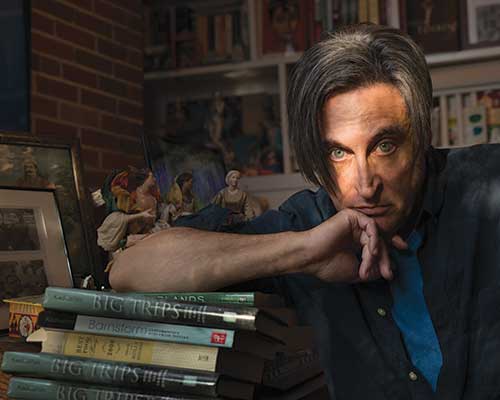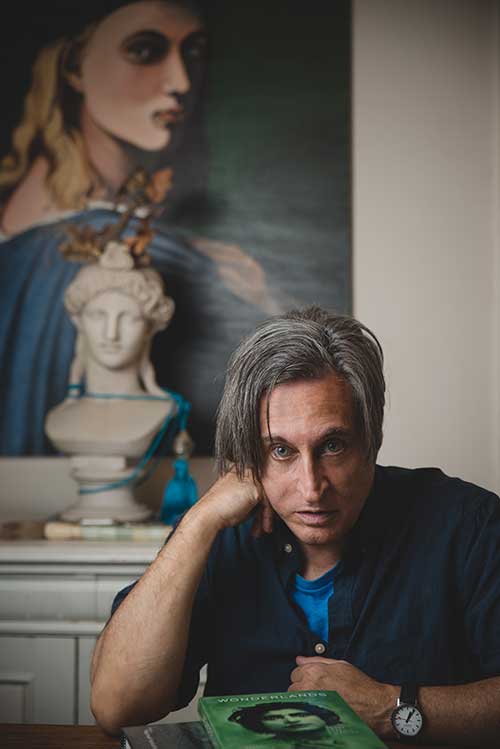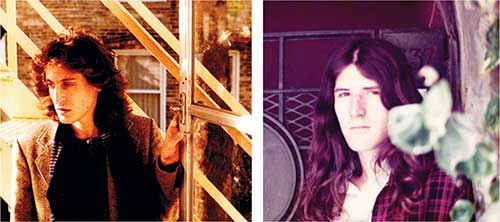I’ve been very lucky throughout my life, at least so far, but probably my greatest luck was having the parents I had. They were both New Yorkers, the children of Jewish immigrants who landed on Ellis Island, escaping the anti-Semitic pogroms that ruled life in the ghettos of Russia and Eastern Europe.
My mom grew up on the lower east side of Manhattan and my dad grew up in the Bronx, above his family grocery store. Their parents came over to America speaking nothing but Yiddish and had to scramble to find any kind of work in New York (like many men of that generation, one of my grandfathers ended up working as a cutter in a tailor shop). But in a generation both my parents had worked their way up and out of their own New York ghettos. My mom ended up running an art gallery in Greenwich Village. And my dad paid his way through a PhD program at Columbia and NYU by working as a postman during the day, and then interrupting his academic program to serve in the Navy during World War II. For Jews, of course, the war was something very personal; almost all our family who remained in Europe, on both my maternal and paternal sides, was killed. When the war was over my parents, who had recently married, went to Europe with pretty much nothing and worked as volunteers to help resettle orphaned Jews. They were so penniless they had to basically stow aboard a freighter to get back home.
All of this experience, plus their own ineffable personalities, helped shape two peerless people. My parents were both incredibly generous, charming, very funny, cosmopolitan; they were steadfast liberals but realists, too, who had no patience for demagogues, bigots, or hypocrites; they knew the difference between substance and trivia. They allowed my sister and me amazing openness and flexibility for the times—but with definite rules to avoid turning us into little entitled poobahs.
Slipping Out of the Closet
What was characteristic of them, and my upbringing, was the fact that I don’t actually remember coming out. I just sort of slipped out in my senior year of high school knowing it wouldn’t be a big deal to my parents, which it wasn’t, and I never had to carry the sense of guilt or anxiety that so many gay kids still seem to be burdened by. The only thing that bothered my parents was the fact that my first boyfriend didn’t seem well-read; that was the big issue for them.
In fact, the only real experience of overt homophobia I ever knew was during the summer before college, when the university police arrested me for kissing my boyfriend at Picnic Point. One of the officers took me into a back room and started banging my head, again and again, against a concrete wall. I was scared but I didn’t feel anything but anger; I’ve never been able to take homophobes seriously.
The other lucky thing about my childhood was the gift of travel. My dad’s first tenure-track job as a professor was at U.W.-Madison; he was already in his 40s then, and most colleges at that time had quotas against hiring Jews. My parents had never lived outside of New York, and when they got here my mom had real culture shock. Luckily my dad’s field of study was child welfare, and he initiated a global study of child welfare systems in different countries. As a result, we lived in Jerusalem and Holland and California and traveled to Europe most summers and New York every other summer. My dad’s study ended up being a big revelation. He was the first scholar to establish the fact that although Americans are so sentimental about children (and by children they mostly mean fetuses) the U.S. came in dead last, compared to other western countries, in terms of child welfare, child poverty, child abuse, and infant mortality. A lot of the child welfare legislation finally enacted in the ‘60s and ‘70s was based on his findings.
All of that travel made for an exciting childhood, and probably instilled my own love of travel and my yin and yang approach to Madison; today I love coming back to our house here but I love leaving it, too. I pretty much ignored high school, which seemed pointless to me, and I didn’t really start seriously studying until college. I went partly here and partly to Sarah Lawrence in New York, with a semester abroad in London. I studied English lit because all I really wanted to do was read and write, since those are the only two things I have ever been good at.
Thomas
Then, in my junior year, I met Thomas McGhee and that was my second big stroke of luck. No one is really looking for a life partner in college; at least I wasn’t. But when I met Tommy at a Christmas party I could sense something was different. Tommy was never afraid of revealing himself; he has an implacable emotional honesty. So even then—I was 19 and he was 21 when we met—he acted on his feelings. I wasn’t ready to move in together. My dad was at the think tank at Stanford, so I would go out and see my parents in Palo Alto on vacation, and then go into San Francisco to see Tommy, who was finishing his degree at the San Francisco Art Institute.
Finally, when I graduated I moved to San Francisco, and we rented an apartment together near Chinatown. Every morning I’d wake up and think, today I will see the dark side of Tommy—but I never did. This went on for two years until an old boyfriend of mine called from New York and wanted to get back together. I had my big epiphany: I was never going to see any dark side at all to Tommy. And I never have. We married two years ago when it was finally legal and my vows expressed why I’ve stayed with Tommy all these years. Even when I coach him, Tommy can’t tell a lie. He is absolutely guileless and has an almost genetic sense of generosity. He’s the kind of person who always befriends the underdog and sees the best in people; when he can’t find anything good to say about someone he finds some way to excuse them. He has this unerring sense of morality.
Start of a Career
The first few years in San Francisco we just did odd jobs and then I went to law school in the city, at Hastings, which was a bore. After that I started a Ph.D. program in English literature. But I realized I didn’t like teaching, and at that time you had to write your doctoral dissertation in an academic jargon that felt stilted to me; I was afraid it would destroy my own voice. So I made the big leap and did the only thing you can do, aside from law, with an English background; I started working in book publishing, as an editor, and I started writing. I was willing to write just about anything as long as I had the freedom to write in my own voice.
I started by writing book and movie reviews, and then we met Karen Kaplan, an editor at Bon Appetit magazine, on a trip to Amsterdam. I started writing their travel stories—another example of luck. I never considered doing food or travel writing. For some reason, though, Karen had faith in me and gave me an assignment, which I realized later was kind of a trial run that the magazine usually doesn’t intend on publishing. The magazine had just been bought up by Condé Nast, and they were looking for food writers who were writers first and foodies second, and they liked my first piece. I ended up writing the majority of Bon Appetit’s culinary travel features for almost a decade, and then becoming a Contributing Editor at the magazine.
From there I started writing for Epicurious, too, but I was also doing more and more travel writing which I liked better because travel writing allows you to tell a complete story. I moved onto writing for National Geographic Traveler magazine, where I became a Contributing Editor as well, and then Condé Nast Traveler, Travel & Leisure, Out, Wall Street Journal, Town & Country, etc. I love travel writing. I approach the pieces as a short story; my favorite pieces focus on revealing something of the mystery or essence of a place, like the dark side of the Grimms fairytale route in Germany, or the roots of gothic in Yorkshire. And plus, of course, in addition to the writing, the travel is a gift in itself, and something I could never afford to do on my own. This year alone, typically, I’ve traveled to Provence, London, the Cotswolds, Amsterdam, Barcelona, Rome, Naples, the Swiss Alps, Greece, Sicily, Hawaii, and Los Cabos on assignments. In the next few months I go back to England, Vienna, Holland, and Morocco. I love the duality this gives my life. Tommy and I are very bonded, in an almost unhealthy way, to our house in Madison, and also to our sense of community here, and the sheer tranquility of the town. Until their recent deaths, too, my parents were here in Madison as well. But if I had to stay here full time I would feel I was missing out on too much of a larger world.
Amplifying Our Voices
At the same time I started writing, I was able to move into acquisitions work in publishing. The acquisitions editor is the person who finds and signs the books the publishing house actually publishes. I think it’s the most creative editorial job because you are shaping a list of books and able to give voice to talented writers who, particularly these days, may otherwise not be able to get published. When I jumped houses (I was originally at Wm C Brown) and started working as an acquisitions editor at the University of Wisconsin Press, I had a lot of creative opportunity. We have always had very strong academic lists at the Press, and I continue to develop them. We are known for our books in classics, film, modern history, and environmental and regional studies. But we had no real trade list when I started acquiring, and I wanted to initiate fiction and creative nonfiction lists.
The first series I launched was our now long-running Living Out series, the only series in the world—today or actually ever—devoted strictly to LGBTQ memoirs. Oddly, the series isn’t as well known locally as it should be, but it is considered one of the premiere LGBTQ lists in the country. I’ve published more than 150 LGBTQ titles in the last 15 years, and our books have been nominated for and won a record number of Lammie Awards. The UW Press’s LGBTQ list is probably the largest original gay arts initiative coming out of Wisconsin. The real key to the success of the series is its range. We’ve published everything from the first memoir of a gay survivor of the Holocaust to Edmund White’s Loss Within Loss, an anthology that looks at what the arts in America have lost to AIDS. We’ve also published Rigoberto Gonzalez’s Butterfly Boy, a gay Latino memoir that won the American Book Award, as well as work by Colm Toibin, Brad Gooch, Bruce Benderson, Martin Duberman, Christopher Bram, Dale Peck, Andrew Holleran, Duncan Fallowell, Emma Donoghue, Leslea Newman, Jewelle Gomez, David Sedaris, Michael Klein, Wayne Koestenbaum, and more. It’s really a who’s who of contemporary LGBTQ writers.
We’ve also published a range of classic LGBTQ writers: Glenway Wescott, Christopher Isherwood, Walt Whitman, etc. Upcoming this fall: Lucy Bledsoe’s A Thin Bright Line, a novel based on the secret life of her namesake lesbian aunt; Good Night, Beloved Comrade, the love letters of Denton Welch, the great British writer and artist, to his partner Eric Oliver; Brian Bouldrey’s Inspired Journeys, a collection of travel writing that contains mostly LGBTQ writers; Julie Tarney’s My Son Wears Heels, a memoir of how a mother learned to raise her gender nonconforming future drag queen son; and the very moving yet still funny memoir Treehab, by pioneering gay comedian Bob Smith, about his life with and beyond ALS.
Writing Your Own Future
Right now I am starting to think about the future in a new way. You always know life is short in a kind of abstract, distanced way. But since my parents died I see, in a visceral way, how fragile life really is, how it vanishes in a split second, and I feel more urgency to do whatever I need to do. I do want to finish a novel; chapters of it have appeared in various stages in a range of anthologies, but I need to complete it.
The other thing Tommy and I talk about is how to stay excited and challenged. We are thinking, sometime in the near future, about dividing our time between our house in Madison and an apartment in London or Amsterdam. Recently I did a story for the Wall Street Journal on Tel Aviv. During that trip I met some survivors from my father’s family and I realized again how lucky I am, as someone born to really the first generation of Jews who didn’t face some form of abject oppression, and often some form of genocide.
And then there has been my own more personal, private run of luck. I’ve never had to live without love, and that’s probably the most anyone can hope for.


























0 Comments